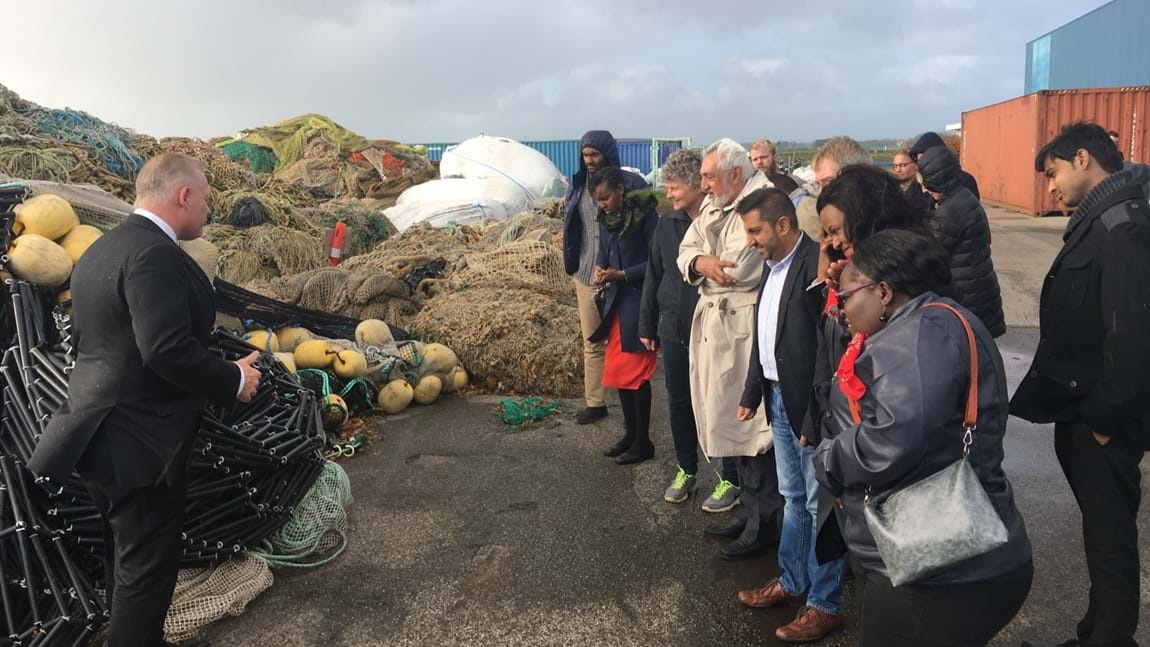Kenyan chief executives inspired by the Danish plastics industry
In Kenya, they use street collectors; in Denmark, we use robots. The Kenyan plastics industry looks to Denmark for inspiration after Kenyan chief executives and industry organisations visited Danish plastic companies.
At a lay-by in Funen, Denmark, a business delegation from the Kenyan plastics industry were quite amazed when they witnessed how Denmark handles plastic recycling.
Denmark has a system of deposit on plastic bottles and as the delegation learnt that this is the system that helps to recycle Danish plastic bottles, the bottle refund machine itself became an event. However, the five Kenyan industry leaders and three representatives from industry organisations were not solely interested in the current Danish solutions; they were also interested in the future.
‘’I did not join just to witness the current solutions in Denmark, but also to see what they have planned for the future. I want to get ready for the solutions offered by the Danish companies tomorrow’’, said Keiran Smith, CEO in plastic manufacturer Mr. Green Africa.
See also: Exceeding targets: Danish companies will recycle 200,000 extra tonnes of plastic
Robot technology should not replace jobs
Keiran Smith’s business model in Kenya’s capital Nairobi is to use street collectors to gather plastic bottles – among other things – which are then converted into plastic granulates and reused in new plastic products.
Mr. Green Africa’s chief executive wants to create jobs, and as labour is inexpensive in Kenya, the CEO was not that interested in Denmark’s innovative robot solutions. Instead, he believed that Kenya can learn from the Danish public/private partnerships.
‘’The Danish plastics industry’s method of gathering many parties from the value-chain in an including process to develop a joint vision for circular economy is definitely something we ought to do in Kenya’’, said Keiran Smith.
Amazed by Danish waste handling
In cooperation with the Danish Environmental Protection Agency, the Confederation of Danish Industries (DI) invited the Kenyan delegation on a three-day trip around Denmark. DI’s sister organisation Kenya Association of Manufacturers (KAM) also participated.
According to Faith Temba, area manager in KAM’s plastic sector, the industry organisations are already working on an order of business for both members and the public authorities that includes circular economy.
‘’But we are eager to learn how to constructively drive this agenda because the future is in circular economy’’, said Faith Temba.
One of the things that left the biggest impression on the business delegation was the Danish way of establishing sustainable solutions partnerships between companies, NGOs and the public sector.
‘’The Danish cooperation is admirable, and I was surprised how efficient the sorting of waste is in Denmark. Surely, it enables a far bigger potential for reusing plastic when it has been sorted’’, said Priyen Tanna, CEO in plastic manufacturer GPL Flexibles.
See also: DI: Climate proposal will make Denmark a frontrunner in green transport
Plastic composes a massive problem in Kenya
In a report from the Danish Environmental Protection Agency, it is estimated that 270,000 tonnes of plastic is produced in Kenya annually solely for packaging – of which only 15 percent is reused. When adding inefficient way of collecting waste, this composes an enormous problem. Around 40 percent of the waste in Kenya is never collected, and what is collected is rarely sorted and therefore not reused.
However, Priyen Tanna, Keiran Smith and the other delegation members are determined to change this. They want to prove that it is doable – just as in Denmark. The private sector must take action to ensure a real change in Kenya.
‘’We can use the same solutions to create bottom-up pressure. The sorting of waste and circular economy in Kenya is not up to date but inspiration from Denmark can be used to solve this problem’’, said Priyen Tanna.
Kenya can take the leap
Keiran Smith believes that it is realistic for Kenya to take the leap towards sustainable plastic production. The phone development in Kenya is a great example on how technology can skip a few development stages, he pointed out.
‘’When the West first started using mobile phones, they were large, unhandy devices. They have now developed to smartphones. However, in Kenya we took a direct leap to smartphones, without going through land-line networks and big “bricks”’’, said Keiran Smith
The Kenyan delegation came to Denmark in connection with the P4G Summit on 19-20 October. During their stay in Denmark, the delegation also paid a visit to plastic technology company Plastix Global in Lemvig, Denmark. This was organised by State of Green. Watch a 2-minute news segment from the visit.

